Recombinant Human Growth/differentiation factor 5 (GDF5)
-
货号:CSB-YP009349HU
-
规格:
-
来源:Yeast
-
其他:
-
货号:CSB-EP009349HU-B
-
规格:
-
来源:E.coli
-
共轭:Avi-tag Biotinylated
E. coli biotin ligase (BirA) is highly specific in covalently attaching biotin to the 15 amino acid AviTag peptide. This recombinant protein was biotinylated in vivo by AviTag-BirA technology, which method is BriA catalyzes amide linkage between the biotin and the specific lysine of the AviTag.
-
其他:
-
货号:CSB-BP009349HU
-
规格:
-
来源:Baculovirus
-
其他:
-
货号:CSB-MP009349HU
-
规格:
-
来源:Mammalian cell
-
其他:
产品详情
-
纯度:>85% (SDS-PAGE)
-
基因名:
-
Uniprot No.:
-
别名:BMP14; Cartilage derived morphogenetic protein 1; Cartilage-derived morphogenetic protein 1; CDMP-1; CDMP1; GDF-5; Gdf5; GDF5_HUMAN; Growth differentiation factor 5; Growth/differentiation factor 5; LAP4; OS5; Radotermin; SYNS2
-
种属:Homo sapiens (Human)
-
蛋白长度:Full Length of Mature Protein
-
表达区域:382-501
-
氨基酸序列APLATRQGK RPSKNLKARC SRKALHVNFK DMGWDDWIIA PLEYEAFHCE GLCEFPLRSH LEPTNHAVIQ TLMNSMDPES TPPTCCVPTR LSPISILFID SANNVVYKQY EDMVVESCGC R
-
蛋白标签:Tag type will be determined during the manufacturing process.
The tag type will be determined during production process. If you have specified tag type, please tell us and we will develop the specified tag preferentially. -
产品提供形式:Lyophilized powder
Note: We will preferentially ship the format that we have in stock, however, if you have any special requirement for the format, please remark your requirement when placing the order, we will prepare according to your demand. -
复溶:We recommend that this vial be briefly centrifuged prior to opening to bring the contents to the bottom. Please reconstitute protein in deionized sterile water to a concentration of 0.1-1.0 mg/mL.We recommend to add 5-50% of glycerol (final concentration) and aliquot for long-term storage at -20℃/-80℃. Our default final concentration of glycerol is 50%. Customers could use it as reference.
-
储存条件:Store at -20°C/-80°C upon receipt, aliquoting is necessary for mutiple use. Avoid repeated freeze-thaw cycles.
-
保质期:The shelf life is related to many factors, storage state, buffer ingredients, storage temperature and the stability of the protein itself.
Generally, the shelf life of liquid form is 6 months at -20°C/-80°C. The shelf life of lyophilized form is 12 months at -20°C/-80°C. -
货期:Delivery time may differ from different purchasing way or location, please kindly consult your local distributors for specific delivery time.Note: All of our proteins are default shipped with normal blue ice packs, if you request to ship with dry ice, please communicate with us in advance and extra fees will be charged.
-
注意事项:Repeated freezing and thawing is not recommended. Store working aliquots at 4°C for up to one week.
-
Datasheet :Please contact us to get it.
相关产品
靶点详情
-
功能:Growth factor involved in bone and cartilage formation. During cartilage development regulates differentiation of chondrogenic tissue through two pathways. Firstly, positively regulates differentiation of chondrogenic tissue through its binding of high affinity with BMPR1B and of less affinity with BMPR1A, leading to induction of SMAD1-SMAD5-SMAD8 complex phosphorylation and then SMAD protein signaling transduction. Secondly, negatively regulates chondrogenic differentiation through its interaction with NOG. Required to prevent excessive muscle loss upon denervation. This function requires SMAD4 and is mediated by phosphorylated SMAD1/5/8. Binds bacterial lipopolysaccharide (LPS) and mediates LPS-induced inflammatory response, including TNF secretion by monocytes.
-
基因功能参考文献:
- We found a strong association between the TT genotype and the risk of developing Knee Osteoarthritis (OR = 1.7, 95% CI = 1.12-2.8, p = 0.014), but not in the heterozygous TC state (OR = 1.56, CI 95% = 0.58-4.17, p = 0.367). PMID: 30044130
- study shows that there exists a relationship between GDF5 (SNP rs143383) and Developmental dysplasia of the hip (DDH) in our population. Second, we found for the first time that the genotype TT and the T allele were overly expressed in the patients and the fathers. More studies on the confirmation of this genetic marker for DDH are called for. PMID: 29797005
- Two Pakistani families with sequence variants in GDF5 and TRPS1 causing brachydactyly type C and tricho-rhino-phalangeal syndrome type III are described. PMID: 29436063
- The dysfunctional gene GDF5 was successfully corrected in adipose tissue-derived mesenchymal stem cells using a pair of transcription activatorlike effector nucleases. PMID: 29393424
- No association has been found between GDF5 +104 T/C promoter polymorphism and osteoarthritis in the Eastern Turkey population. PMID: 28886316
- The results of the current study revealed that SNP rs143383 of GDF5 is a compelling risk factor for knee OA [Osteoarthritis] and that GDF5 has an etiological effect on the development of OA [Osteoarthritis]. PMID: 29056119
- A Study of IL-1beta, MMP-3, TGF-beta1, and GDF5 Polymorphisms and Their Association with Primary Frozen Shoulder in a Chinese Han Population PMID: 28676856
- BMP-14 rs143383 polymorphism reduced the susceptibility to knee osteoarthritis (OA) and hand OA not only in total analysis but also in subgroup analysis; BMP-14 rs143383 polymorphism may be a protective factor against OA occurrence PMID: 29049177
- The structure of Grem2-GDF5 complex has revealed a number of key findings for DAN-family mediated BMP2 inhibition. PMID: 27524626
- miR-615-3p negatively regulates the osteogenic differentiation of hLF cells through post-transcriptionally suppressing osteogenic regulators GDF5 and FOXO1. PMID: 28460412
- p38, c-jun, and NFkappaB pathways activated during intervertebral disc degeneration by IL-1beta but not GDF-5 PMID: 27391542
- GDF5 elicited significant (p < 0.05) changes in the expression of anabolic, catabolic and hypertrophic genes with several consistent effects in healthy donors and in OA patients PMID: 28481944
- GDF5 was up regulated in patients after chronic rhinosinusitis developing osteitis. PMID: 27888647
- Titanium (Ti) surface modification with the combination of hBMP-2 and hGDF-5 for the two growth factor-coated Ti implants can improve the clinical properties of implants for orthopedic and dental applications. PMID: 28124978
- he large array of modular enhancers for Gdf5 provide a new foundation for studying the spatial specificity of joint patterning in vertebrates, as well as new candidates for regulatory regions that may also influence osteoarthritis risk in human population PMID: 27902701
- The purpose of this study is to investigate the immunohistochemical expression of cytokeratin 18 (CK18) and the reactivity to GDF5 (CDMP-1), called the morphogenetic protein-1, cartilage-derived, in lingual squamous cell carcinoma. PMID: 27151703
- homozygous sequence variants in the GDF5 gene underlie acromesomelic dysplasia type-grebe in consanguineous families PMID: 27577507
- The prevention of IL-1Beta-induced nucleus pulposus extracellular matrix degeneration by miR-7 silencing was attenuated by GDF5 siRNA. PMID: 27583982
- Mutations in three genes (GDF5, NPR2, BMPR1B) have been reported to cause different forms of acromesomelic dysplasia PMID: 26926249
- we demonstrate that the transforming growth factor-beta1 and the growth differentiation factor 5 synergistically drive the nucleopulpogenic differentiation process. The commitment of the hASCs was robust and highly specific as attested by the expression of NP-related genes characteristic of young healthy human NP cells PMID: 26661057
- The data suggest that Ad-GDF-5 gene therapy is a potential treatment for IDD, which restores the functions of degenerative intervertebral disc through enhancing the ECM production of human NP cells. PMID: 26739524
- An association of SNP in GDF5 with temporomandibular joint osteoarthritis in female Han Chinese. PMID: 25757091
- results demonstrate that SNP rs143383 of GDF5 is a compelling risk factor for both knee and hand osteoarthritis (OA) and provide further support for GDF5 in the etiology of OA [meta-analysis] PMID: 25894512
- Two novel homozygous missense mutations in the GDF5 gene cause brachydactyly type C. PMID: 25820810
- our results showed that GDF-5 and BMPRII expressed both in normal and degenerated intervertebral disc tissues, and GDF-5 might have an inhibition effect on degenerated lumbar intervertebral discs PMID: 25755766
- This meta-analysis finds that the C allele and CC genotype of the GDF5 gene are protective for knee osteoarthritis susceptibility. PMID: 25467786
- Our results revealed that the GDF5 SNP was associated with susceptibility to the meniscus injury and postoperative function recovery in Chinese male soldiers. PMID: 24227118
- missense mutations p.T201P and p.L263P interfere with the protein structure and thereby reduce the amount of fully processed, biologically active GDF5, finally causing the clinical loss of function phenotype. PMID: 25092592
- The proregion is stabilized by an intramolecular disulfide bond. The isolated proregion folds independently of the mature domain. PMID: 25174448
- Growth differentiation factor 5 and canonical Wnt signaling may contribute to molecular mechanisms of osteoarthritis. PMID: 24561281
- These results suggest that obesity leads to upregulation of GDF5 expression responsible for the promotion of brown adipogenesis through a mechanism relevant to activation of the NF-kappaB pathway. PMID: 25223801
- results suggested that GDF5 polymorphism is associated with susceptibility to symptomatic lumbar disc herniation in Chinese Han population and type II collagen in the nucleus pulposus may be a factor in susceptibility to symptomatic lumbar disc herniation PMID: 24105021
- Osteoarthritis chondrocytes do not respond in a predictable manner to culture with exogenous GDF5. PMID: 24466161
- High GDF5 expression is associated with osteoarthritis. PMID: 24861163
- The expression of growth differentiation factor 5 (GDF5) and aggrecan in 15 cases of salivary gland pleomorphic adenomas, was investigated. PMID: 24398992
- established an association between two SNPs (rs224332 and rs224333) of GDF5 and DDH development in a female Chinese population. PMID: 24114442
- In vitro findings suggest that the degenerating disc milieu, with high proinflammatory cytokine levels, may limit expression of GDF-5, resulting in limited regenerative capacity of the intact disc. PMID: 24582800
- These novel insights into the biology of GDF5 might also provide further clues on the pathophysiology of OA. PMID: 24098149
- The novel missense mutation p.Leu176Pro causes impaired secretion of GDF5 in Brachydactyly type C and mild Grebe type chondrodyslplasia. PMID: 23812741
- GDF5 is the only osteoarthritis susceptibility gene so far identified with definite evidence.[Review] PMID: 24003854
- Overall, a statistically significant association was found between the +104T/C polymorphism of GDF5 and risk of knee osteoarthritis PMID: 23151597
- GDF5 harbors a C/A transversion located -41 bp relative to the transcription start site that leads to increased gene expression. PMID: 22929025
- GDF5 polymorphisms are associated with susceptibility to low back pain during military training in Chinese soldiers. PMID: 23725396
- In conclusion, the rs143383 variant was not found to associate with the risk of ACL rupture. PMID: 23090674
- we have identified four trans-acting factors that are binding to GDF5, three of which are modulating GDF5 expression via the OA susceptibility locus rs143383. PMID: 23825960
- Although the effect size of the association between OA and GDF5 is small, there is suggestive evidence for an association. PMID: 23423687
- GDF5 regulates TGF-beta-dependent angiogenesis in breast carcinoma cells. PMID: 23226264
- Growth differentiation factor 5 modulation of chondrogenesis of self-assembled constructs involves gap junction-mediated intercellular communication. PMID: 23121099
- analysis of positive selection on the osteoarthritis-risk and decreased-height associated variants at the GDF5 gene in East Asians PMID: 22905146
- Our findings in 5 population cohorts from Northern Europe indicate that a variant in the GDF5 gene is a risk factor for lumbar disc degeneration in women. PMID: 21360499
显示更多
收起更多
-
相关疾病:Acromesomelic chondrodysplasia, Grebe type (AMDG); Acromesomelic chondrodysplasia, Hunter-Thompson type (AMDH); Brachydactyly C (BDC); Du Pan syndrome (DPS); Symphalangism, proximal 1B (SYM1B); Multiple synostoses syndrome 2 (SYNS2); Brachydactyly A2 (BDA2); Osteoarthritis 5 (OS5); Brachydactyly A1, C (BDA1C)
-
亚细胞定位:Secreted. Cell membrane.
-
蛋白家族:TGF-beta family
-
组织特异性:Predominantly expressed in long bones during embryonic development. Expressed in monocytes (at protein level).
-
数据库链接:
HGNC: 4220
OMIM: 112600
KEGG: hsa:8200
STRING: 9606.ENSP00000363489
UniGene: Hs.1573
Most popular with customers
-
Recombinant Human Tumor necrosis factor receptor superfamily member 14 (TNFRSF14), partial (Active)
Express system: Mammalian cell
Species: Homo sapiens (Human)
-
Recombinant Human SARS coronavirus Spike glycoprotein (S), partial (Active)
Express system: Mammalian cell
Species: Human SARS coronavirus (SARS-CoV) (Severe acute respiratory syndrome coronavirus)
-
Recombinant Human Tumor necrosis factor receptor superfamily member 8 (TNFRSF8), partial (Active)
Express system: Mammalian cell
Species: Homo sapiens (Human)
-
Recombinant Human Tumor necrosis factor receptor superfamily member 9 (TNFRSF9), partial (Active)
Express system: Mammalian cell
Species: Homo sapiens (Human)
-
Recombinant Human IGF-like family receptor 1 (IGFLR1), partial (Active)
Express system: Mammalian cell
Species: Homo sapiens (Human)
-
Recombinant Mouse Prolactin receptor (Prlr), partial (Active)
Express system: Mammalian cell
Species: Mus musculus (Mouse)
-
Recombinant Rabbit Tissue factor pathway inhibitor (TFPI) (Active)
Express system: Mammalian cell
Species: Oryctolagus cuniculus (Rabbit)
-
Recombinant Human Angiopoietin-2 (ANGPT2) (Active)
Express system: Mammalian cell
Species: Homo sapiens (Human)



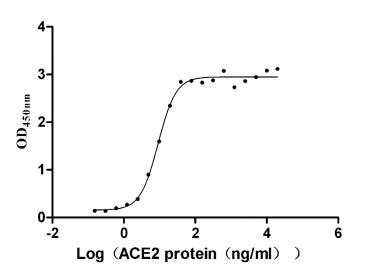
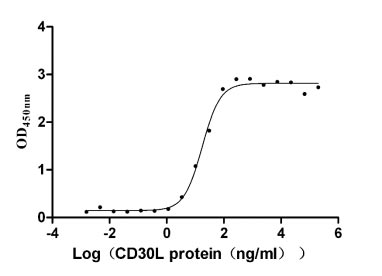
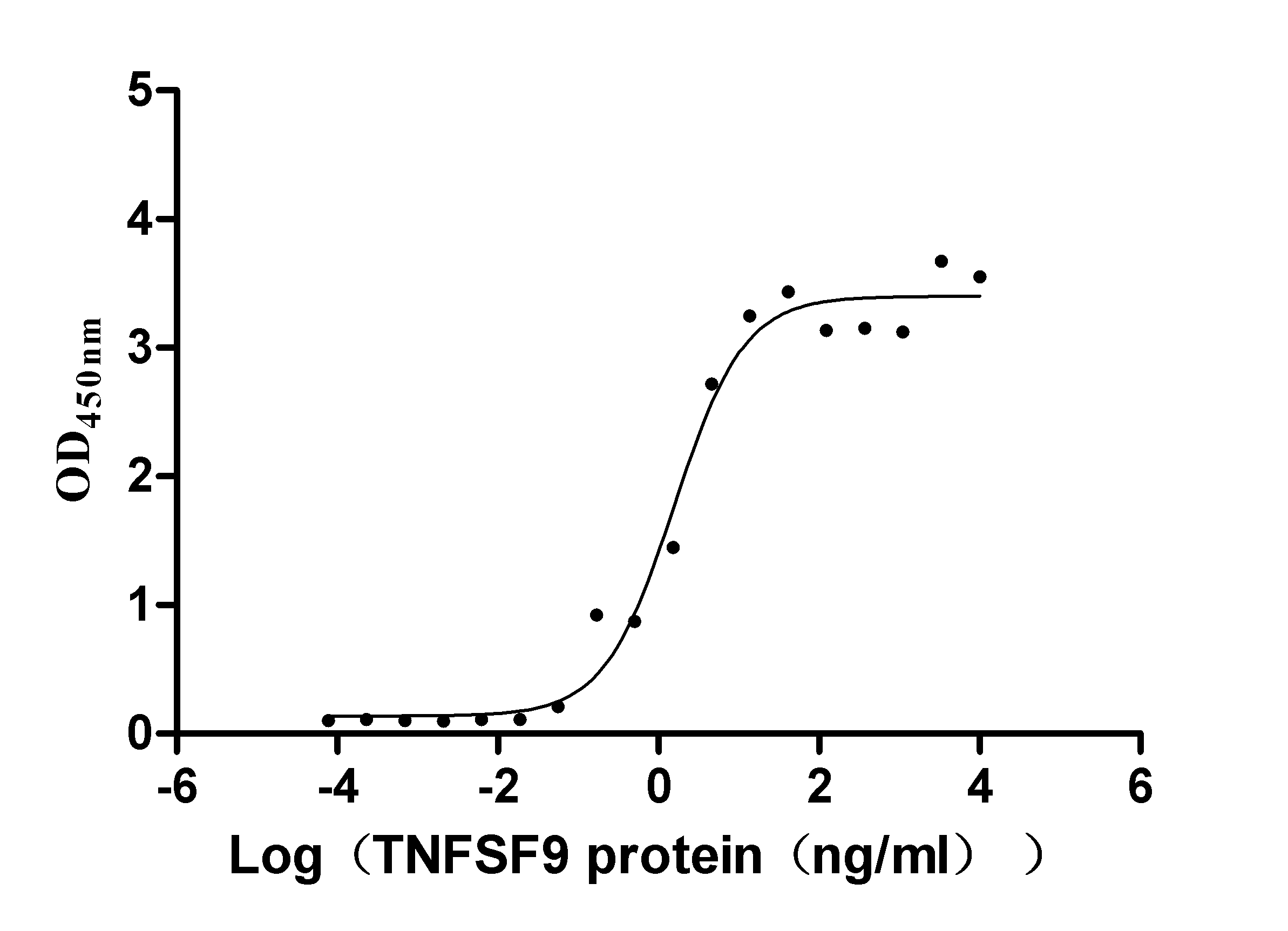
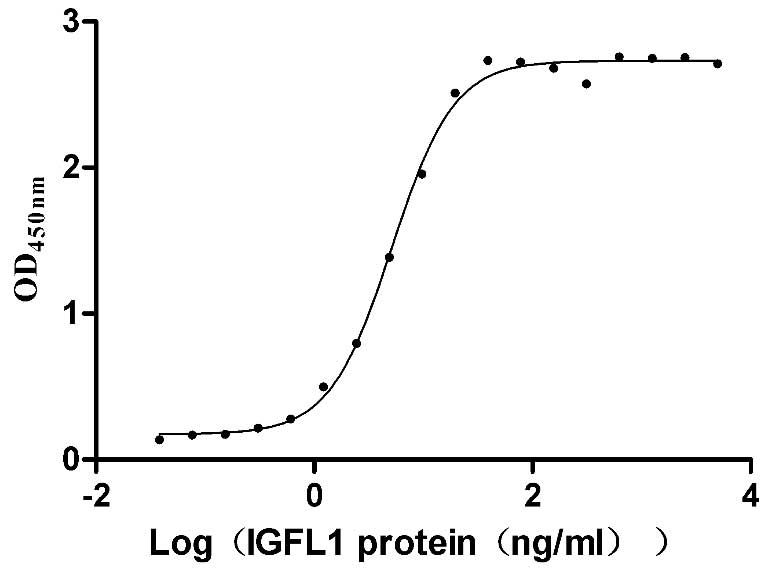
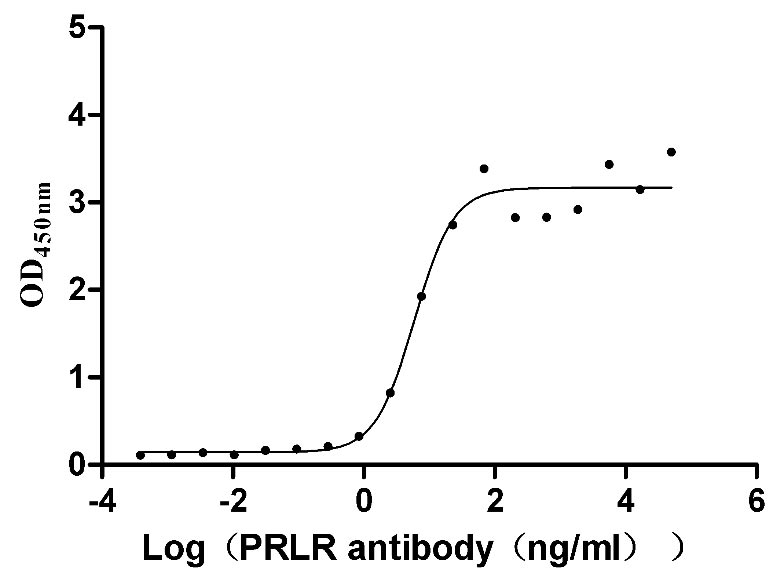
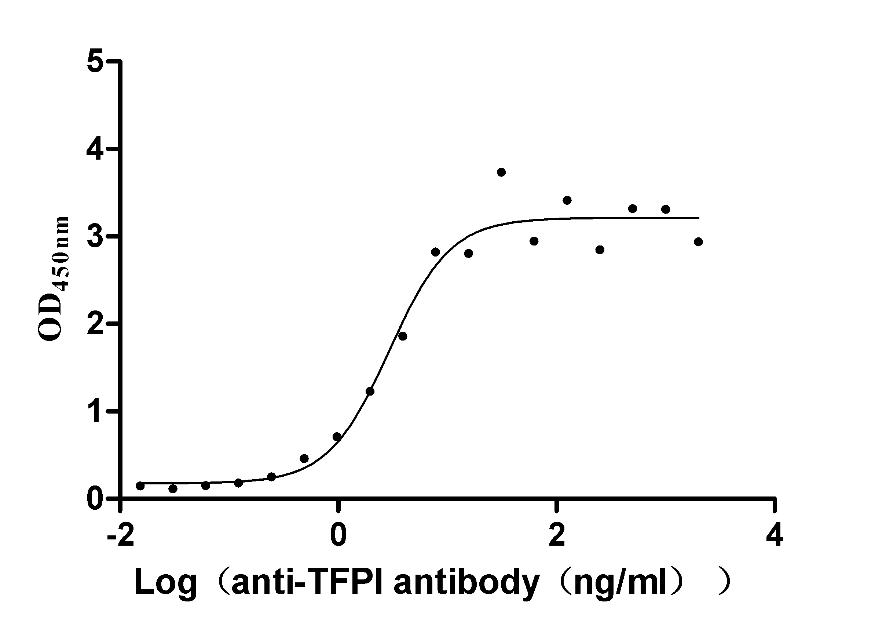
-AC1.jpg)










